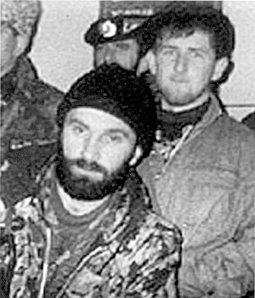The choice of unfreedom By Sergei Gligashvili, special to Prague Watchdog
A well-known Russian anthropologist recently confessed to me in dismay that he was unable to say anything sensible about the current state of affairs in Chechnya. Indeed, reality is slipping away from the usual interpretations, though many people who keep a close eye on developments in Chechnya still stick, through inertia, to the standard schemes and conceptions. Nevertheless, even the most adamant liberal supporters of Chechen independence do not venture to claim that today's Chechen insurgency is the same symbol of liberation and anti-colonial struggle that adorned the democratic banners of the mid-1990's.
We must at last acknowledge, honestly and impartially, that what has happened in history before has happened now – a national revolution has turned into dark political reaction. Chechen reality today embraces two totalitarian projects, each of which in its own way seeks a maximum limitation of human freedom. The only problem is whether these projects – Kadyrov’s Chechnya and the Caucasus Emirate – are the people’s voluntary choice.
As a mental experiment, imagine that at a certain point all the Russian troops were to leave the republic completely. Would the Kadyrov regime suddenly collapse, swept away by a wave of popular anger, as many claim? I must admit that I seriously doubt it. If only just a few years ago few people really saw Kadyrov as a leader, today a great many support him, believe that he represents a reliable and stable, if not very radiant, future for the Chechen people. What I mean is that, like the Afghan leader Nadzhibullah before him, he derives his primary support from his own armed forces, and they may be enough for him to control the situation. In addition, however, his regime enjoys considerable public support, and this is far more important than any power structures.
But let us leave the subject of Kadyrov. In the voluntary nature of the Caucasus Emirate there is no doubt. It is of course, impossible to give an accurate assessment of the number of sympathizers and supporters the armed insurgency has in Chechnya itself, but to judge by the mood that prevails in the Chechen emigration, that support is massive. In its way, the theocratic model of the Caucasus Emirate is a mirror image of Kadyrov’s totalitarian regime. The mujahideen openly reject the democratic social order. A Chechen human rights defender once said that he could see no fundamental difference between the two systems: if it ever came to power, the Emirate would impose its own order by force, just as Kadyrov’s regime does now.
So why have the long years of liberation struggle led Chechen society to such a deplorable result? I think the problem lies in the very nature of Dudayev’s revolution. It was not a democratic revolution – it can best be described as an ethnic or nationalist one. The creation of an independent nation-state was based on romantic ideas about the exclusive role of the Chechen tradition of nation-building. The Chechens turned to their own past, and on its basis were going to create a fundamentally new social model. At the same time, however, Dudayev followed the example of all the national leaders of that time and also tried to introduce democratic institutions of government. We know how those attempts ended. The national idea fits poorly with democracy, but ideally with dictatorship, as Kadyrov is demonstrating today. The massive defection of Ichkeria’s supporters to the side of the current Chechen government is due primarily to the absence of any real contradiction between the slogans of national revival of the early 1990s and Kadyrov’s declarations of today.
One often hears it said that the Chechens cannot be held responsible for what is happening, as the slave psychology which has penetrated all spheres of life is totally alien to the Chechen spirit. That psychology is brought in from outside, from Russia. As soon as Russia loses its power in Chechnya, the slavery too will go away. But where will it go, if now the only alternative to the Kadyrov project is a theocracy that is even further removed from the ideals of social freedom?
Many of modern Russia's problems have their pedigree in the Bolshevik Revolution. The Russian people’s stubborn unwillingness to acknowledge their responsibility for the fact that it was Russia which in the early twentieth century established the most non-free political regime in the history of mankind prevents them from escaping the consequences of Bolshevism, and this is now being manifested in a very serious relapse into unfreedom. Only a sober and courageous look at the past and an understanding of their own national guilt may help them to break out of the vicious circle of reincarnations of slavery.
In this way, by shifting the responsibility for their problems onto Russia, the Chechens are repeating the Russians’ mistakes, and like them are blocking their own road to the future.
Photo: uisrussia.msu.ru. (Translation by DM) (P,DM)
DISCUSSION FORUM
|

